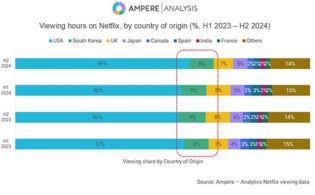Ted Sarandos, Netflix’s co-CEO and chief content officer, interviewed Bela Bajaria, the streamer’s global head of TV, at the Paley International Council Summit, discussing international originals, making the call to cancel shows and the recent restructure of her team.
Bajaria first joined Netflix to run its unscripted division. “We brought her in to invent unscripted at Netflix,” Sarandos said. “She built an entire organization from scratch and put some of the most talked-about unscripted shows of the year on Netflix.”
She went on to take over international originals at the platform before being upped to head of global television. “What gives us great pride at Netflix is entertaining the world,” Bajaria said. “Historically, Hollywood was always export. Now [we’re] making shows in any language from any country and they are traveling everywhere. I want us to be at the forefront of entertaining the world, and I love that we do that in so many ways. We can do it with a reality show about an Indian matchmaker, we can do it in a French comedy about a family business, we can do it in a limited series about a chess prodigy and we can do it with a prestigious show about the British monarchy.”
As for what she looks for, Bajaria said, “A distinct, authentic voice and, most importantly, a show that members love.”
Addressing the raft of new competitors in the market, Bajaria said, “Competition is good for consumers. As a fan of TV, I watch a lot of our competitors’ shows; it’s important to know what people are making. But it’s also hard to move forward if you’re constantly looking over your shoulder. Mostly I spend my time focused on Netflix and our members and our shows. The competition is not zero-sum. It keeps us all trying to deliver our best for the viewers.”
Addressing the platform’s cancellation rate, Bajaria said that the decisions are always “painful. We order straight to series versus doing pilots, which results sometimes in more season one cancellations. Even with that, I still believe a season order versus a pilot is a better creative expression of a writers’ idea. Also, if you look at seasons two and more, we have a renewal rate of 67 percent, which is industry standard. We also do make a large amount of first season shows, so it feels disproportionate that we have more first season cancellations. But if you look at the renewal rate, it’s really strong. We’ve had long-running shows and we’ll always have that. We just want to have the best creative expression of those shows.”
Sarandos added that in this new age of television, with different business models, “the thing that marked success prior to Netflix and OTT subscription television was getting to syndication. [Now] many shows can be a success for being exactly what they are. You could tell that story in two seasons or one season or five seasons. The Crown is by design a six-season show. I think [our cancellation rate] gets talked about so much because it’s measured against the old way of doing things.”
Asked about content plans for AsiaPac, where Netflix has seen tremendous gains, Bajaria noted, “In India, we are going into more unscripted, which has been a nice complement to the slate. We have a very strong slate next year in lots of different genres. When we started, we had some great big shows but many of them were darker and edgier. Now you’re seeing a wider variety of genres and tones. With Korea, it’s been rewarding to see this love of K dramas, not just in Korea—they travel to Japan, Southeast Asia and the U.S. Kingdom had huge impact. Similarly, in Japan, looking at anime and the investment there. I’m excited about the slates coming up; the next two years look really interesting AsiaPac.”
Discussing the recent restructuring of her team, Bajaria explained, “We said, what is the most effective way to build this for the next two years? Where are we going and what is the quickest way to get there as far as efficiency, internally and externally? In the drama group, we put development and current, and that is for a very specific reason: it’s the volume we have in that group. For us, it was innovating on a structure that existed in other places, but for me, it was what’s best for Netflix.”
Sarandos added, “There’s so much about television and film that works. At our organization, there was no reason to have a current team seven or eight years ago when everything we had was brand new. As we get into more sophisticated levels of development, that will continue to evolve.”





